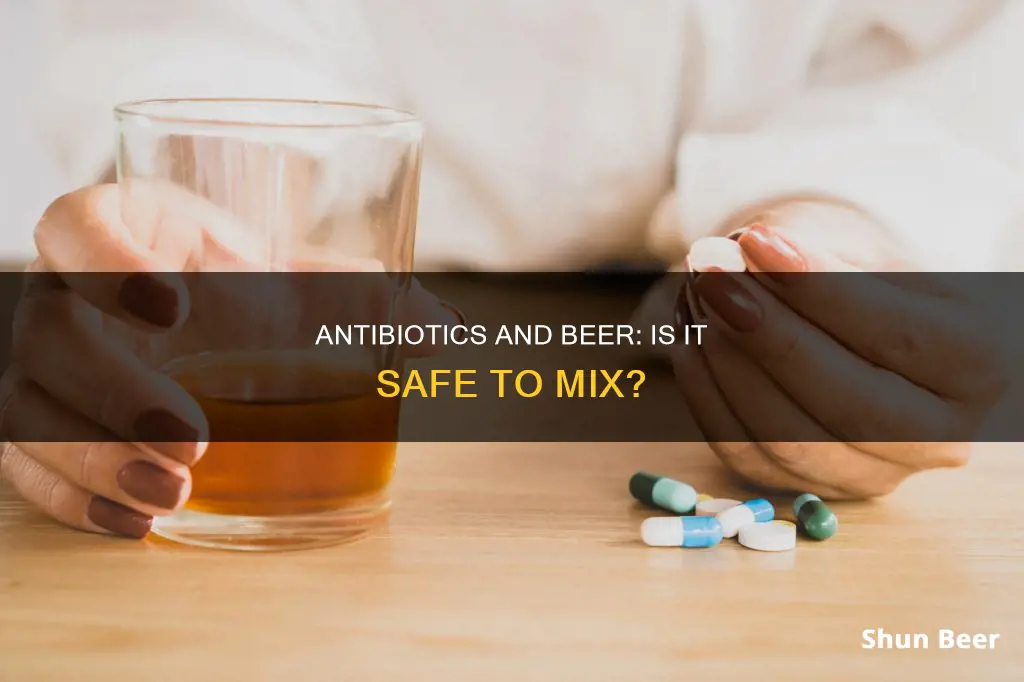
Drinking alcohol while on antibiotics is generally not recommended, as it can negatively impact your recovery and cause side effects such as nausea and vomiting. Alcohol can also affect how your body metabolises antibiotics, potentially reducing their effectiveness or increasing their toxicity. While it may be tempting to unwind with a beer, it is best to wait until you have finished your course of antibiotics.
| Characteristics | Values |
|---|---|
| Alcohol's effect on antibiotic effectiveness | Alcohol does not make most antibiotics less effective, but it may increase the chance of experiencing certain side effects. |
| Alcohol's effect on recovery | Alcohol can slow down recovery by causing dehydration and poor sleep. |
| Alcohol's effect on the immune system | Alcohol can weaken the immune system, making it easier to pick up contagious illnesses. |
| Alcohol's effect on antibiotic side effects | Alcohol can worsen the side effects of antibiotics, such as nausea, digestive problems, and liver damage. |
| Antibiotics that should not be mixed with alcohol | Metronidazole, tinidazole, cefoperazone, cefotetan, ketoconazole, isoniazid, linezolid, doxycycline, and erythromycin. |
| Antibiotics that may be affected by undistilled alcoholic drinks | Linezolid |
| Antibiotics that may be less effective in heavy drinkers | Doxycycline |
What You'll Learn

Alcohol and antibiotics can cause nausea and digestive issues
Nausea is a common side effect of antibiotics, and drinking alcohol while taking them can increase feelings of nausea. Alcohol is broken down into acetaldehyde by the body, which can cause nausea. Antibiotics can also cause stomach or digestive side effects, and consuming alcohol while taking them can worsen these symptoms.
In addition to nausea, alcohol and antibiotics can also cause other digestive issues such as vomiting, stomach pain, and diarrhea. These side effects can be unpleasant and may prolong the recovery process. It is important to follow the instructions of your healthcare provider when taking antibiotics and to avoid alcohol if there is a risk of negative interactions.
Alcohol can also negatively impact the immune system, making it more difficult for the body to fight off infections. It can interfere with sleep and hydration, which are critical components of recovering from an infection. Additionally, alcohol can affect how antibiotics are metabolized in the body, potentially reducing their effectiveness or increasing their toxicity.
The combination of alcohol and antibiotics can also lead to a "disulfiram-like reaction", especially with antibiotics such as metronidazole and tinidazole. This reaction can cause symptoms such as flushing of the skin, stomach cramps, vomiting, and difficulty breathing. It is important to avoid alcohol while taking these antibiotics and for a period of time after stopping them.
Overall, it is generally recommended to avoid alcohol while taking antibiotics to prevent negative side effects and ensure the effectiveness of the medication.
Mixing Beer and Whiskey: A Safe Drinking Guide
You may want to see also

Alcohol can reduce your energy and delay recovery
Alcohol also affects your sleep patterns, reducing the amount of rapid eye movement (REM) sleep you get. This can leave you feeling drowsy and low in energy the next day. Additionally, alcohol's impact on sleep can reduce the amount of human growth hormone (HGH) in your body, which is essential for muscle building and repair.
Furthermore, alcohol can decrease testosterone levels, which are necessary for muscle development and recovery. It can also increase the production of the enzyme lactate, leading to muscle cramps and further delaying recovery.
Alcohol also affects the absorption of nutrients such as zinc, vitamins B1 and B12, which are important for energy and metabolism. This can further contribute to reduced energy levels and delayed recovery.
Overall, alcohol consumption can have a significant impact on your energy levels and recovery, especially when combined with physical activity or injury. It is advisable to avoid alcohol consumption, especially during the recovery process, to ensure optimal healing and energy levels.
Microneedling: Drinking Beer, What You Need to Know
You may want to see also

Mixing alcohol and antibiotics may cause liver damage
It is not advisable to drink alcohol while on antibiotics. Alcohol can amplify the side effects of antibiotics, such as nausea, vomiting, and diarrhea, and cause additional side effects like dizziness, drowsiness, headaches, and even seizures. Mixing alcohol with antibiotics can also damage vital organs, including the liver.
The liver breaks down alcohol by converting it first to acetaldehyde, which is toxic to the body, and then to acetate. Some antibiotics, such as isoniazid and ketoconazole, can become toxic in the liver, and when combined with alcohol, increase the risk of severe liver damage. Signs of a damaged liver could include dark-colored urine and/or stool, and a yellow tint in the eyes or skin.
Excessive alcohol use is well-known to cause liver damage, such as cirrhosis. Taking antibiotics that can also damage the liver may worsen these types of problems. It is important to call your doctor right away if you experience any signs of liver damage.
Therefore, it is recommended to avoid alcohol until you have completed your course of antibiotics and your body has received adequate rest and nutrition.
Beer and Bulking: What's the Verdict?
You may want to see also

Alcohol can negatively impact your immune system
It is generally advised to avoid drinking alcohol while on antibiotics due to the negative effects it can have on the immune system. Alcohol can hinder the body's ability to recover from an infection and interfere with essential healing processes such as sleep and hydration. Here are some ways in which alcohol consumption can negatively impact the immune system:
Impaired White Blood Cell Function
Excessive alcohol consumption can impair the production and function of white blood cells, particularly neutrophils and macrophages. These cells play a critical role in the immune response by migrating to the site of infection and destroying harmful pathogens. Alcohol can reduce the number and effectiveness of these cells, making it more difficult for the body to fight off foreign invaders.
Increased Intestinal Permeability
Alcohol can increase intestinal permeability, leading to what is known as "leaky gut syndrome." This condition allows bacteria and toxins to leak into the bloodstream from the intestines, triggering an immune response and contributing to chronic systemic inflammation. It also makes it easier for disease-causing bacteria to overtake the "good" bacteria in the gut, further compromising the immune system.
Disruption of Healthy Gut Bacteria
Alcohol can kill the healthy bacteria in the gut, which play an important role in maintaining overall health. This disruption of the gut microbiome can have negative consequences for the immune system, as these bacteria help to regulate inflammation and support immune function.
Impaired Vitamin Absorption
Heavy alcohol consumption can lead to deficiencies in vitamins such as B6 and folate, which are essential for the proper functioning of the immune system. B vitamins, in particular, play a crucial role in supporting immune health, and chronic deficiencies can leave individuals vulnerable to diseases.
Liver Damage
The liver is a vital organ of the immune system, responsible for removing harmful substances from the body. However, heavy alcohol consumption can cause serious liver damage, impairing its function and compromising the body's ability to fight off infections.
Sleep Disturbances
Alcohol consumption can negatively impact sleep quality and duration, which, in turn, can affect immune function. Adequate, restful sleep is important for enhancing the activity of T cells, which are responsible for fighting against pathogens, including viral particles. Poor sleep can also contribute to increased inflammation in the body and negatively impact mental health.
Beer Belly: Is Your Weekend Drinking to Blame?
You may want to see also

Alcohol can hinder your body's ability to absorb vital nutrients
Drinking alcohol while on antibiotics is not recommended due to the harmful interactions and negative effects that can occur. Alcohol can hinder your body's ability to absorb vital nutrients, which can have several detrimental effects on your health.
Firstly, alcohol holds little to no nutritional value. The calories in alcohol are not converted to glycogen, a form of stored carbohydrates, and thus do not provide a good source of energy for the body. Alcohol also inhibits the absorption and usage of essential nutrients, such as thiamin (vitamin B1), vitamin B12, folic acid, and zinc. Thiamin, for example, is crucial for metabolising proteins and fats, as well as forming haemoglobin. Folic acid is integral to the formation of new cells, and a deficiency can lead to a blood disorder called megaloblastic anaemia, which reduces the oxygen-carrying capacity of the blood. Zinc is essential to energy metabolic processes, and its depletion due to alcohol consumption further reduces endurance.
Secondly, alcohol disrupts your sleep cycle, reducing your brain's ability to learn and retain information. Sleep is also when much of our memory formation occurs, and alcohol's impact on sleep can therefore hinder this process.
Thirdly, alcohol is a toxin that travels through your bloodstream, causing dehydration and slowing down the body's ability to heal. It disrupts the water balance in muscle cells, altering their ability to produce adenosine triphosphate (ATP), the primary source of energy for muscle contractions.
Finally, alcohol increases blood sugar levels and can trigger the release of large doses of vitamin A, causing a slight improvement in vision followed by night blindness.
Overall, alcohol consumption can have a detrimental effect on your body's ability to absorb and utilise vital nutrients, impacting your health and well-being.
Beer and Yeast Infections: What Men Should Know
You may want to see also
Frequently asked questions
It is not advisable to drink beer or any other form of alcohol while on antibiotics. Alcohol can reduce your energy and delay recovery, and it may also cause severe side effects when mixed with certain antibiotics.
Side effects of drinking alcohol while on antibiotics include nausea, vomiting, stomach pain, flushing, liver damage, and a reduced ability to fight infection.
It is generally safe to consume alcohol while taking most common antibiotics. However, it is important to note that even moderate alcohol consumption can interfere with your body's ability to heal and recover from an infection. It is always best to consult with a doctor or pharmacist before mixing alcohol with any medication.







